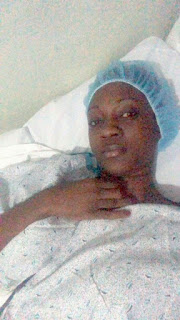Watch Caroline Sampson As She Sheds Tears While Narrating Her Sad Experience With Haemorrhoids(Piles)
She revealed on social media that she’s being treating piles or haemorrhoids (known as “kookoo” in local parlance).
She also shared the healing process after her surgery .
Caroline couldn't contain her tears when she took to snapchat to update fans on her healing whilst advising them to take their health serious in the video below;
Haemorrhoids (also known as piles) are swollen and inflamed veins in the rectum or anus. Typical symptoms are pain, itching and bleeding around the anal area. Treatment and prevention will often involve non-prescription ointments, other home treatments and lifestyle changes. Haemorrhoids that don’t clear up may require a visit to your doctor and, in some cases, minor surgery.
Causes
Haemorrhoids are caused by an increase in pressure in the lower rectum from:
- straining during bowel movements
- sitting for long periods of time, especially on the toilet
- chronic (long lasting) constipation or diarrhoea
- being overweight or obese
- pregnancy
- anal intercourse
- low-fibre diet
- spinal cord injury
- poor posture.
Haemorrhoids are common and occur in most people at some stage during their lives. They tend to occur more frequently later in life due to age-related weakening and stretching of the tissues supporting the veins in the rectum.
Signs and symptoms
Symptoms often depend on whether a haemorrhoid is located on the inside or outside of the body.
Internal haemorrhoids lie inside the rectum and usually do not cause discomfort. However, straining or irritation when passing a stool can damage the surface of a haemorrhoid causing it to bleed. Sometimes, straining can push an internal haemorrhoid through the anal opening resulting in a protruding or prolapsed haemorrhoid, which can cause pain and irritation.
External haemorrhoids lie under the skin around the anus. When irritated they can itch or bleed. Blood can pool inside an external haemorrhoid and form a clot, which causes severe pain, swelling, and inflammation.
Signs and symptoms of haemorrhoids may include:
Internal haemorrhoids lie inside the rectum and usually do not cause discomfort. However, straining or irritation when passing a stool can damage the surface of a haemorrhoid causing it to bleed. Sometimes, straining can push an internal haemorrhoid through the anal opening resulting in a protruding or prolapsed haemorrhoid, which can cause pain and irritation.
External haemorrhoids lie under the skin around the anus. When irritated they can itch or bleed. Blood can pool inside an external haemorrhoid and form a clot, which causes severe pain, swelling, and inflammation.
Signs and symptoms of haemorrhoids may include:
- pain or discomfort, especially when sitting
- pain during bowel movements
- itching or irritation around the anal region
- bright red blood on your stools, toilet paper or in the toilet bowl
- swelling around the anus
- one or more lumps near the anus, which might be tender or painful.
Bleeding during bowel movements is the most common sign of haemorrhoids. Rectal bleeding can, however, indicate a more serious condition, such as bowel cancer or anal cancer. You should consult your doctor if your haemorrhoids:
- bleed frequently or excessively
- do not respond to self-treatment
- if haemorrhoid symptoms have been accompanied by an obvious change in bowel habits
- if you are passing black or maroon-coloured stools
- blood clots have formed
- blood is mixed in with the stool.
Prevention
Keeping your stools soft is the best way to prevent haemorrhoids from occurring. The following steps can help to prevent haemorrhoids from occurring and reduce symptoms of existing haemorrhoids:
- eat high-fibre foods
- drink plenty of fluids
- consider using fibre supplements
- avoid straining when on the toilet
- go to the toilet as soon as you feel the urge
- get plenty of exercise
- avoid sitting for long periods.
Video Source: @esineymar





Comments
Post a Comment